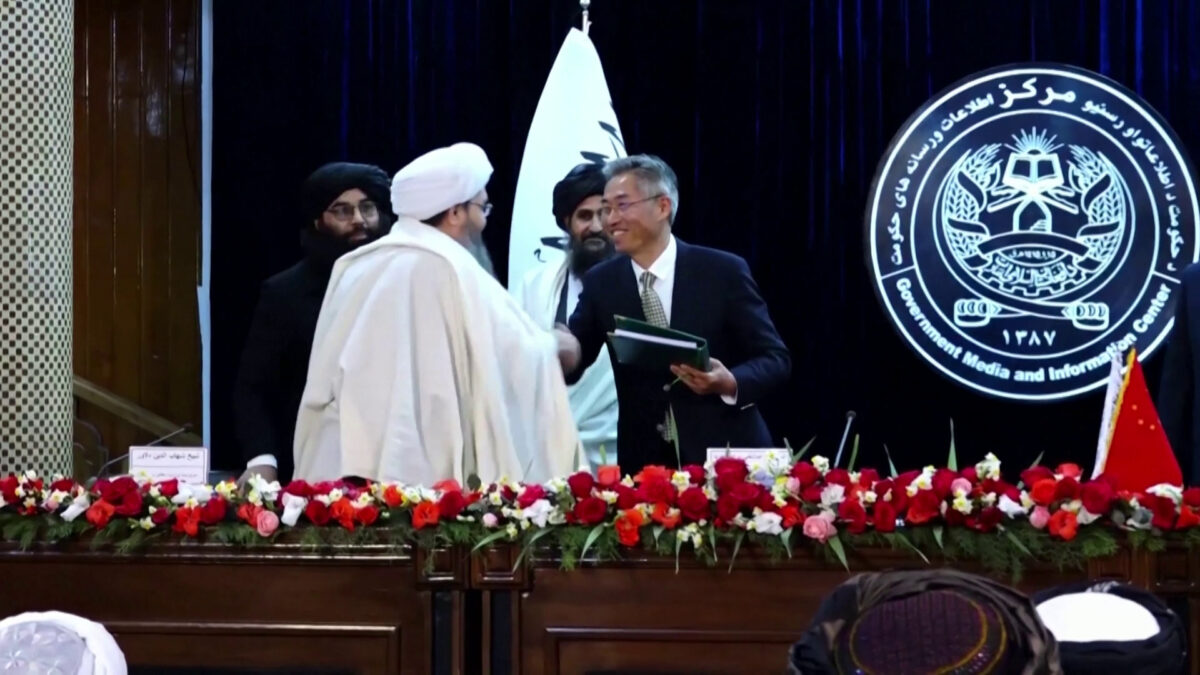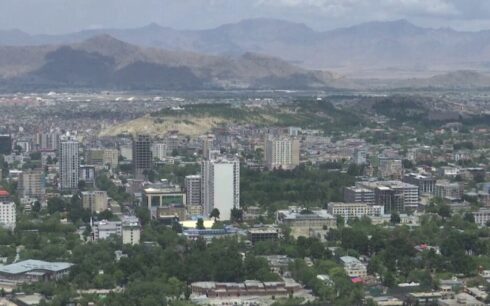New geopolitics are playing out in the region and mineral-rich Central Asian countries are caught up in the game – an issue highlighted by many experts – and for Afghanistan, it’s geographic location along the Belt and Road Initiative (BRI) plays a vital role in China’s efforts to develop both Central Asia and its western territory, which would ultimately serve China’s economic and strategic interests.
Foreign Minister Wang Yi told his counterparts from Afghanistan and Pakistan that “we will jointly build the Belt and Road Initiative, extend the China-Pakistan Economic Corridor to Afghanistan, and help Afghanistan participate in regional connectivity.”
There is potentially the chance for China to fill the “vacuum” that has been left after the US withdrawal from Afghanistan and undoubtedly, China and Russia were seen as the main beneficiaries of the United States’ departure, specifically in terms of their political influence, regional and international rivalries and the expression of power.
Afghanistan is an underdeveloped country with vast natural resources, in particular, lithium, cobalt, copper, gold, natural gas, coal, and oil. The country has an estimated 16 trillion cubic feet of gas, 500 billion barrels of liquified natural gas, and 1.6 trillion barrels of crude oil, as per the U.S. Geological Survey. The total estimated value of Afghanistan’s natural resources is $1 trillion and was a source of attraction for China after the U.S’s withdrawal. Due to its growing domestic energy demand and tight global supplies since the start of the Russia-Ukraine war, China is concerned about both energy security and access, and wants to explore new options in addition to producing clean energy.
Similarly, Afghanistan is a market for the export of Chinese goods, which further encourages Beijing to remain engaged with the country.
There is no doubt that Beijing is using this opportunity in Afghanistan to invest in important projects. Beijing’s investment in Afghanistan is the first of its kind by a foreign nation since the takeover of the Taliban.
In fact, this is evidence of a strategic change in Beijing’s policy towards the Taliban. China played a limited economic role in Afghanistan during the past 20 years – during the western-installed regime – so this is an abrupt change, in the face of instability and illegitimacy following the Taliban’s takeover.
In 2008, the Metallurgical Corporation of China and Jiangxi Copper won a contract to develop and extract a copper mine in Mes Aynak; while in 2011, Chinese energy company China National Petroleum Corp (CNPC) won a tender to extract oil in Amu Darya in the north of the country. At the time, this sparked hope that China’s investment might bring about a measure of economic progress.
But the two projects stalled under the former government, which took back the Amu Darya concession. Now, the Taliban has renewed the same concession with a CNPC subsidiary. This investment agreement has been made with the Taliban government – which does not have legitimacy either internally or externally. China itself, has yet to recognize the Taliban as the legitimate government of Afghanistan.
Meanwhile, Mes Aynak, one of China’s investments, has become a byword for broken Chinese dreams in Kabul.
In both cases, the over-publicized agreements for all ancillary infrastructure including a railway line, power station and refinery, never materialized.
China has not been cooperative with aid, but Beijing has constantly pushed for alternatives to bolster the Taliban financially. China has introduced a new subsidiary company of CNPC to retake the left-over Amu Darya contract and continue investment in Afghanistan. In addition, an air corridor, which was established to export Afghan pine nuts to China has resumed and the number of Chinese investors and businessmen visiting Kabul has tripled since the Taliban takeover.
There is no doubt that Afghanistan’s minerals are an attractive prize for Chinese companies on the lookout for untapped resources to feed insatiable domestic demand. Chinese companies are state-owned and protected; they also have a higher risk tolerance than Western companies. But in the wake of two big project failures and the presence of an illegitimate government, why would a potentially more unstable Afghanistan suddenly become more attractive to Beijing?
The Chinese government employs an economic approach by utilizing investment opportunities to secure its control in resource-rich countries in the world. The adoption of a global green energy policy and zero emission policy and advent of electrical vehicles, has further created demand for lithium and other valuable minerals, which Afghanistan has. This has pushed China to act quickly.
With the US withdrawal, at such a critical time of global demand for minerals that Afghanistan has, China stepped in to fill the vacuum and build a strategic relationship with the Taliban – in a bid to monopolize these resources.
Security and stability in Afghanistan is crucial to China’s plan as an unstable Afghanistan may not only cause instability in China’s northern province of Xinjiang but it could also threaten China’s ambitious plan for integration of Central Asia.
China’s strategy of using economic tools to further its foreign policy goals is not unique to Afghanistan. But China is investing in a country that lacks legitimacy and is neither internally nor externally sovereign – a country where cabinet members are wanted as terrorists and who are on UN and US black lists.
Investments by state-owned Chinese corporations indicate China’s investment is a long-term partnership with the Taliban – for Afghanistan’s valuable mineral resources. Investment in Afghanistan serves a dual purpose for China – it locks in Afghanistan’s resources for its booming industry and controls the resource-rich yet troubled nation, which is in China’s neighborhood.
China has long been waiting to sweep in and pluck the country’s economic riches, waiting for the country to be cleared of its Western impediment. When Kabul fell, China did not condemn the move and announced instead that it respects the decision of the people of Afghanistan – a sign of welcoming from Beijing to the Taliban and it clearly supports the narrative that the Taliban government has the full support of Beijing. For their part, Taliban leaders have repeatedly made assurances to Beijing that they will not allow their territory to be used against China or its interests.
Despite Uyghur militants taking sanctuary for decades in Afghanistan, Beijing welcomed Taliban’s return to power and kept its embassy open throughout the chaotic fall of Kabul. It also kept up broad diplomatic relationships with the Taliban leadership to protect its strategic interests in Afghanistan. But Beijing still has concern that under the Taliban, Afghanistan will become a safe haven for Uyghur militants from China’s western Xinjiang region and may destabilize their western frontier.
However, from a geopolitical perspective, a well-established U.S. security presence on China’s western border was not in the best interests of Beijing, which had forged a good relationship with the Taliban.
In view of the current situation in Afghanistan, the Taliban cannot be picky when it comes to foreign investment and political support. However, the Taliban regime has high expectations of China, which is primarily due to its strategic rivalry with the U.S. Moreover, Beijing is seeking to pave the way for Afghanistan’s inclusion in the China-Pakistan Economic Corridor (CPEC). China’s Foreign Minister Wang Yi, during his visit to Afghanistan, expressed China’s desire to extend the CPEC to Afghanistan.
China is also aiming to align BRI initiatives with the development strategies of Afghanistan, support the extension of the China-Pakistan Economic Corridor to Afghanistan, and share China’s development opportunities, which will bring more economic support to the Taliban.
China has also resumed the issuance of visas to Afghan nationals.
In fact, China is expanding its presence in every sphere in Afghanistan and holds the Taliban to its promise to not allow Afghan soil to be used by Uyghur militants against China’s security and interests.
China is reportedly providing drones to the Taliban in order to strengthen their capacity to neutralize their opponents.
The risk for China is that the still radical Taliban will not be able to stabilize Afghanistan politically nor integrate it economically with the world. China’s strategic interests in Afghanistan are to prevent the country from becoming an arena of geopolitical competition; prevent Afghanistan from falling back into the orbit of the West; and promote stability to prevent the country from becoming a safe haven for Uyghur militant groups.
The author is a former official of the mining sector who has, for security reasons, asked to remain anonymous.
*Quote by Heraclitus





